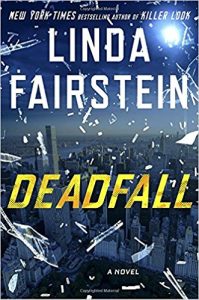Linda Fairstein, the internationally bestselling author of the Alexandra Cooper novels and former Manhattan assistant district attorney, has written Deadfall, the latest in the series.
Killer Look, the book immediately preceding Deadfall, ended with Alex and Mike on the steps of the Metropolitan Museum of Art where Alex’s boss, D.A. Paul Battaglia was shot in the head.
Deadfall, the 19th book in the series, picks up the story with Paul Battaglia falling dead into Alex’s arms. Alex immediately becomes the prime suspect, based not only on her proximity to the shooting, but also due to her tension-filled relationship with Battaglia and the fact that he made a series of telephone calls to her shortly before his death. Despite being a prime suspect, Alex, along with Mike, sets out to find the truth. They soon find themselves immersed in the case files of Battaglia’s associates, and in a world of secret societies involved with big game hunting on U.S. soil.
“Deadfall” begins only a few hours after the previous novel, “Killer Look,” ended. Did you already have the idea for “Deadfall” in mind when you ended “Killer Look”?
Unlike most suspense novels, Killer Look had a shocking ending.
My agent and editor loved the cliffhanger element of that book, and it made it so easy for me to begin to write Deadfall. 
The novel starts six hours after Battaglia was killed. In Deadfall, Alex Cooper is both a witness to the murder and the prime suspect. Writing the first one-hundred pages was so exciting for me because I’d never before had her in that predicament.
Alex immediately becomes a suspect in the murder. Her interrogation by Detective Jaxson Stern is brutal. Tell us about that.
Yes, Alex becomes a suspect. I turned the tables on her. As a suspect being interrogated, she finds herself having the same reactions to questioning as other people have had when she’s been the questioner.
One of the first things I learned as a prosecutor was the art of interrogation. I learned it from colleagues in the D.A.’s office, and from the best homicide detectives in the NYPD. It’s an extraordinary skill when it’s done well. It’s terrifying when it’s done wrong or badly. As an interrogator, Jaxson Stern has an axe to grind and there may be no getting out from beneath it for Alex.
To make matters worse, Alex is still recovering from PTSD due to her having been abducted two books earlier. Tell us about that.
I wanted to write Devils Bridge partly through the eyes of Mike Chapman, the other major character in the series. So, at the beginning of that novel, Alex is kidnapped. Part of the reason I wanted to do that is the fact that many women readers have developed crushes on Mike. [Laughter]. I also thought having Alex deal with PTSD was important because she’s seen it in so many victims of various crimes with whom she’s been involved as a prosecutor. I wanted to explore how she would react after having survived being kidnapped.
In Deadfall, she’s still suffering from PTSD, but her predicament jolts her into wanting to get back on her feet.
The book’s title “Deadfall” has more than one meaning. Will you describe them for us?
I’d never heard the word before. When I was researching this novel at the Bronx Zoo, among other places, I first heard the term ‘deadfall.’ The zookeeper explained that in nature, when lighting or some other phenomenon has felled trees and creates a huge tangle of brush, it’s called a ‘deadfall.’
The other meaning of the term, which is appropriate to this book, involves hunters laying a trap by digging a pit and covering it with brush and branches so when an animal walks on the covering, it falls below to its death.
It also refers to the victim, Paul Battaglia, on the first page of the novel, falling dead into Alex’s arms after being shot.
I love how you bring current and recent events into your novels. In “Deadfall,” there’s mention of Justice Antonin Scalia’s death. Tell us about that.
Antonin Scalia was a charismatic law professor at the University of Virginia where I went to law school. When he died, I was completely surprised that he died at a private hunting lodge and game preserve, and was a member of an order involved in shooting big game. I was also surprised that Scalia died alone in a cabin and there was no investigation into the cause of his death. When I looked into it, I was amazed by the number of conspiracy theories surrounding his death. It played into this very secretive world of hunting clubs and preserves all over the country which fit easily into the novel.
And the issues of species extinction and of hunting, and smuggling plays an important role in “Deadfall.”
Yes, it does. I love animals and I’ve become increasingly concerned about the probable extinction of many species of animals in the next few years. There are many animals that will no longer live on this planet if the current rate of decline continues. Some are hunted for their body parts and this frequently ties in with drug smuggling. It seemed a natural issue for me to tackle in this novel.
The dialogue in each new Alex Cooper seems edgier than before. Is that a fair statement?
Yes, it’s very fair. When I wrote the first six books in the series, I was still a prosecutor. I was very careful about language because I still worked for the government. It took me a few years after leaving the DA’s office to loosen up. Over the last three books, with Alex having been kidnapped and with her becoming a suspect, another side of her has emerged. It probably reflects more of me than the character. Alex is feeling very liberated, as do I. I’ve always loved writing dialogue. It’s always been my favorite part of storytelling.
Can you complete this sentence: Writing novels has taught me_________________?
Writing novels has taught me how difficult it is to use language well. I’ve always been a voracious reader and never thought about the process of writing. But writing about the same characters in this world I’ve created, and wanting to express things sharply and clearly, has taught me a great deal about the use of language. It’s taught me about using words, how to put them together, how to be clear, and ultimately, by learning how to better express what I want to say, I’ve learned more about myself.
What’s coming next from Linda Fairstein?
The next Devlin Quick mystery is coming. It’s a middle-school grade book called Digging for Trouble and will be coming out in November. It’s set in Montana where there are many dinosaur bones which play into the story.
Congratulations on penning “Deadfall,” the nineteenth Alex Cooper novel in an addictive series that’s become an annual staple in so many readers’ literary diets, including my own.




